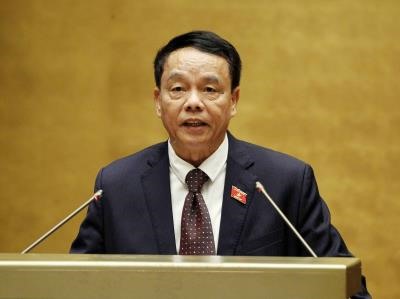 Politics & Law
Politics & Law

National Assembly (NA) deputies on Tuesday morning raised concerns over the risk of an information access barrier to Vietnamese citizens and companies posed by the draft law on internet security.
 |
| Võ Trọng Việt, chairman of the National Assembly’s Committee on National Defence-Security, presents the NA’s review on the draft law of internet security to the NA deputies on Tuesday. - VNA/VNS Photo |
HÀ NỘI — National Assembly (NA) deputies have raised concerns over the risk of an information access barrier to Vietnamese citizens and companies posed by the draft law on internet security.
The draft law insists on foreign service providers storing customers’ information in local servers.
On Tuesday morning, NA members gathered in the main hall to discuss for the second time the draft law prepared by the Ministry of Public Security, which is meant to ensure national security in the age of the internet.
Deputy Phạm Thị Thanh Thúy from Thanh Hóa Province opposed Article 26 of the law. It requires that all local and foreign organisations and companies, which provide internet services or own an information network in Việt Nam, must set up a representative office in the country and store their customers’ personal data as well as important data related to national security in local servers.
Thúy called for reconsideration of this regulation. Data servers of many popular internet services are located overseas, she said, adding that the world now increasingly relies on cloud server, or virtual server, to store data instead of a physical server like earlier.
“Such requirement is hardly feasible and will create problems for the Vietnamese people to access information on the internet (if service providers fail to comply to the law),” she said.
Phú Thọ Province deputy Cao Đình Thưởng said it would be good if the law could make foreign businesses store data in local servers, but questioned the consequences if those companies, for example, the two giants---Facebook and Google---refused to do so.
“What is our solution? Will we ask them to stop providing the service?” he asked.
Nghệ An Province deputy Nguyễn Hữu Cầu, who is also the director of the provincial police department, defended the regulation regarding the establishment of a representative office. He cited Facebook, which had so far set up some 70 offices in other countries, to imply that the company could open a new office in Việt Nam.
The regulation, according to him, was “reasonable and practical”. — VNS




